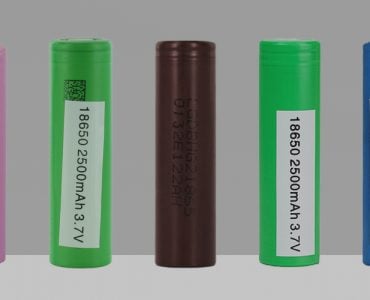Take a look at the best vape pens on the market
Vape pens make it simple to vape. These are vaping devices that come in the shape of a pen. This makes them comfortable to hold and easy to carry around. They’re also simple to use, affordable and will provide great flavor thanks to their use of a tank.
But with so many different options, it can be hard to find the right one for you. That’s why we’ve put together this list of the best vape pens for e-liquid in 2025. These vape pens have been selected based on their performance, reliability, portability and ease of use and come from vaping manufacturers that you can trust.
OUR TOP PICKS

Why Trust Us
All of our buyer's guides and reviews are based on market research, expert input, and practical experience with the products we include. This way, we offer genuine, accurate guides to help you find the best picks.
How we test
4.0
Excellent
- Dimensions: 112.5mm x Ø23.4mm
- Draw: RDL and MTL
- Ejuice Capacity: 5ml
- Battery Size: 1500mAh
- Charging Type: 2A, Type-C
- Adjustable Airflow: Yes
- Output: Up to 25W
- Pods: 0.6Ω, 0.8Ω
PROS
- Huge 5ml vape liquid capacity
- Clever airflow control, adjusted by twisting the pod
- High-capacity 1500mAh battery with fast 2A charging
- COREX coil keeps e-liquids tasting great
- Can be used for MTL or RDL vaping
CONS
- Bottom-fill rather than top-fill pods
- A bit chunky for a pen-style vape
Why We Picked It
The VAPORESSO VECO GO is a small and simple device that offers powerful draws up to 25W, while still providing the portability that is desired in a vape pen. You can also easily adjust the airflow on the VECO GO by simply twisting the pod. Twist it left for more airflow or right for less.
The kit includes a 0.6Ω pod that is excellent for either RDL or MTL vaping. VAPORESSO’s “COREX Heating Tech” makes these coils very efficient, vaporizing the e-liquid consistently and providing good flavor. You can get a good throat hit and even blow some decent clouds should you wish to.
The pods for the VECO GO are possibly its most appealing and unique features because they can hold up to 5ml of ejuice. That’s as much as two and a half times the “standard” capacity of similar pen-style devices. A full pod can easily last for two days before needing to be topped up, and even heavy users should be able to get away with only having to refill once a day.
You can buy a pack of two replacement pods fairly cheaply, but thanks to the COREX heating technology used inside the coils, you might not need to do that as often as you might expect. In addition to the 0.6Ω pod that comes included, there are also 0.8Ω pods available to be purchased separately.
The VECO GO features a generous, built in 1500mAh battery which, from dead, can be fully charged in about 40 minutes. It’s leak-proof, compact, and gives you the ability to customize your draw. These are all big pros that make the VECO GO a recommended device for those in the market for a new vape pen.
Read our full review on the VAPORESSO VECO GO.
SAVE 10%
CODE: VERSED
Approx. Price: $20 USD
4.0
Excellent
- Dimensions: —
- Draw: Tight MTL
- Ejuice Capacity: 2ml
- Battery Size: 500mAh (pen) + 1800mAh (power bank)
- Charging Type: Type-C
- Adjustable Airflow: No
- Output: 10W
- Pods: Doric Galaxy Cartridge (1.2Ω)
PROS
- Very light and portable for a power bank + pen combo
- 1800mAh powerbank and 500mAh pen last for days of vaping
- Included filter drip tips go a long way towards mimicking the sensation of smoking
- Tight MTL draw is excellent for those transitioning to vaping
- Included pod does great with all ejuice ratios (50VG, 60VG, 70VG)
CONS
- Filter tips get very dirty if not stored in the power bank
- No adjustable airflow or adjustable wattage
- Only includes one pod
Why We Picked It
VOOPOO’s Doric Galaxy vape pen may be a simple, but it still has a lot to offer. It’s super small and portable, yet still packs a 500mAh battery and can output up to 10W. These specs make it the perfect vape pen for vaping nicotine salt eliquids, although it can be used for vaping freebase nicotine ejuices as well.
For those vapers who are transitioning to vaping from smoking, the Doric Galaxy comes with filter drip tips to more closely mimic the smoking experience. Simply replace the plastic drip tip with one of the included filter drip tips and you’re set.
If you’re concerned about battery life, the Doric Galaxy can also be purchased as a kit with a power bank. This power bank has an 1800mAh battery capacity and can be used to recharge the Doric Galaxy on-the-go. There’s no cables required either because the Doric Galaxy magnetically and wirelessly docks to the power bank, making it really easy to keep it charged.
If you like the idea of a simple vape pen with filter drip tips, the Doric Galaxy delivers all this and more. Highly recommended for smokers looking to get into vaping.
Read our full review on the VOOPOO Doric Galaxy.
SAVE 12%
CODE: VERSED
Approx. Price: $35 USD
4.0
Excellent
- Dimensions: 126mm x Ø27.3mm
- Draw: DTL
- Ejuice Capacity: 4.5ml
- Battery Size: 3000mAh
- Charging Type: 2A Type-C
- Adjustable Airflow: Yes
- Output: 40-80W
- Coils: 0.15Ω MS mesh coil, 0.25Ω MS mesh coil
PROS
- Super user-friendly
- Superb build quality
- Nice and pocketable design
- Pod stays securely attached
- Both coils deliver excellent flavor
- Lots of battery protections
CONS
- No easy way to check your power level
- Tank uses a lot of ejuice
- Longish charging time
Why We Picked It
The Freemax Marvos T improves on the already simple vape pen form factor by being even easier to use than its competition. It uses a pod style tank that magnetically attaches to the battery so you can quickly remove it to refill the tank or change coils. The dual adjustable bottom airflow design delivers a great draw and the large 4.5ml tank provides amazing flavour and vapor production.
The Freemax Marvos T starter kit comes with one 0.15Ω mesh coil and one 0.25Ω mesh coil. This tank is based on Freemax’s highly rated “Fireluke” tank series so this kit will give new vapers an extremely flavorful vaping experience in an easy to use device.
The Freemax Marvos T has a massive 3000mAh battery and charges with the included Type-C USB cable. The battery size on this device means that you won’t have to worry about charging it all the time. The Marvos T has a maximum output of 80 watts and the wattage can be adjusted between three levels for each coil. These three wattage levels are pre programmed to be appropriate for the coil so you can use whichever one you like best!
Some other convenient features of the Marvos T are the 8 second cut off protection, short circuit protection and low voltage protection. The soft touch paint is nice to hold and there are a variety of different colors to choose from.
The Freemax Marvos T kit comes included with everything you’ll need to start vaping except for the ejuice so be sure to pick some up! The Freemax Marvos T starter kit is a great purchase for entry-level vapers and will provide a satisfactory vaping experience with minimal hassle.
Approx. Price: $30 USD
4.0
Excellent
- Dimensions: 116mm x Ø22mm
- Draw: MTL
- Ejuice Capacity: 2ml
- Battery Size: 550mAh
- Charging Type: 2A Type-C
- Adjustable Airflow: No
- Output: 3.1-3.5V, 8-12W
- Coils: Two Geekvape One Pods (0.8Ω and 1.2Ω)
PROS
- Very compact
- Easy filling due to top fill system
- Excellent flavor
- 15 minute fast charge
- Leakproof
- IP68 rated
CONS
- Can be difficult to see remaining ejuice
Why We Picked It
The Geekvape Aegis 1FC immediately caught our attention due to its compact size, making it perfect for those who prefer a discreet and portable vape pen. Despite the small size, the Aegis 1FC brings strong and flavorful draws that are perfect for the flavor chasers out there.
The battery for the Aegis 1FC is on the smaller side at 550mAh, however the Type-C fast charging brings it to a full charge in only 15 minutes, ensuring minimal downtime.
There is only one button on the Aegis 1FC. This button can be used to check the status of the battery via the 3 LEDs on the side of the device. This button is also used to fire the device or to control the output levels. The 1FC will display a green light for the 3.5V output, blue for the 3.3V output, and red for the 3.1V output. The Aegis 1FC embodies ease of use while still packing the features that are desired in a modern day vaping device.
The Aegis 1FC includes two Aegis One pods: a 0.8Ω pod (12-16W) pre-installed in the device and a 1.2Ω pod (8-12W). These pods fit in place easily with the use of magnets. These pods are easy to fill via the top fill hole and are designed to be leak proof.
As a bonus, the Aegis 1FC is IP68 rated water and dust resistant. This provides a bit more peace of mind in everyday use as it is still quite a durable device despite its size. Compact, durable, and leak proof, the Aegis 1FC is the perfect vape pen for both advanced and beginner vapers looking for a device with excellent performance and minimal downtime.
SAVE 10%
CODE: VERSED
Approx. Price: $15 USD
3.5
Good
- Dimensions: 110.3mm x Ø26mm
- Draw: DTL and MTL coil options
- Ejuice Capacity: 5ml
- Battery Size: 3000mAh
- Charging Type: 5V/2A Type-C
- Adjustable Airflow: Yes
- Output: 0-4V, 80W max
- Coils: GTX 0.2Ω mesh coil, compatible with GTX line coils
PROS
- Uses the excellent GTX coil line
- No settings to adjust (good for beginners)
- No leaking
- Feels good in the hand
- Pod stays securely attached
- Lots of coil options
CONS
- Flavor is decent but could be better
- Only comes with one coil
- Longish charging time
Why We Picked It
The GTX GO 80 by Vaporesso is a beautiful and cheap vape pen kit. The tank and battery attach magnetically on the GTX GO 80 and the device itself is pen shaped. It comes in a variety of nice colors and it’s a well-built, minimalist vape pen.
The tank will hold a whopping 5ml of eliquid and features an easy to use top filling system that comes off with a simple quarter-turn. This starter kit comes with one GTX mesh 0.20Ω coil and it’s compatible with Vaporesso’s entire GTX coil line up. These coils perform great with all kinds of eliquid and the GTX GO 80 delivers respectable flavor and clouds that any beginner will enjoy.
The battery on the GTX GO 80 is an integrated, high efficiency 3000mAh battery that charges through a Type-C port on the device. This vape starter kit is extremely easy to use, with a single fire button that is also used to turn the device on or off. You won’t have to worry about adjusting anything with the GTX GO 80; just hit the fire button to draw.
The GTX GO 80 also has multiple safety features built in such as: low voltage protection, short circuit protection, and low resistance protection. It’s a great vape pen; you’ll definitely be happy with the GTX GO 80.
Read our full review on the GTX GO 80.
SAVE 10%
CODE: VERSED
Approx. Price: $30 USD
What Is An E-Liquid Vape Pen?
An e-liquid vape pen is a mod that is round and tall, and looks like a tube. In the past, vape pens were actually a similar size as pens. However, nowadays vape pens are much larger and wider in order to accommodate larger internal batteries and larger diameter tanks.
Regulated e-liquid vape pens, like the ones found on our list, come with a variety of battery safety features built in. They work very similar to regulated box mods; they maintain a safe wattage output to your coil and ensure that you’re not overdrawing from your battery.
Vape pens are the go-to for beginner vapers because they make it easy to start. You get everything you need in the box with little-to-no assembly needed. In addition, most vape pens only have a single button and this makes them super straightforward to use. If you’re just getting into vaping, vape pens are the way to go.
Different Types Of E-Liquid Vape Pens
Vape pens come in many different varieties and sizes. But the most important differentiating factor between them is how they deliver power to the tank. There are three types of vape pens: adjustable, direct output and constant output.
Adjustable: Adjustable vape pens allow you to manually adjust the wattage going to your coil. This gives you a greater level of control over the type of vape that you want. If you want a denser, hotter, and more flavorful hit you can crank the wattage up. For lighter, cooler hits you can turn the wattage down.
These vape pens typically fire at a higher wattages and require more power out of the device. For these reasons, adjustable vape pens usually use a 21700 battery or pack a high-capacity internal battery.
Direct Output: Direct output vape pens regulate and deliver power to your coil based on the charge level of the battery. When the battery is fully charged you’ll get maximum power and flavor. As the battery depletes, you’ll notice the draw gradually getting weaker. These devices typically function on a range from 4.2V to 3.2V.
Constant Output: Constant output vape pens function at a consistent voltage even as the battery depletes. These devices usually output 3.7V for the best draw and flavor. Constant output mods come with a chipset to regulate and deliver this constant voltage.
How To Choose The Right Vape Pen For You
When choosing a vape pen it’s important to consider what type of draw you’re seeking. If you’re just transitioning from smoking to vaping, you might like a vape pen that delivers a tight MTL draw. If a super tight draw isn’t your thing, the you may want to go for a vape pen that delivers a looser, airier draw. A vape pen with a looser draw will also deliver larger, denser hits.
Battery life can also be a big deciding factor for some. If you’re constantly on the go, you’ll want to pick up a vape pen with a larger battery to last you. Just as good is a vape pen with replaceable batteries. This will allow you to swap batteries on the fly and keep you from being stuck without a vape.
No matter what type of vape pen you’re looking for, there’s something for everyone.
Let us help you
Have a question or a comment? Need help? Even if you just want to share your love for vaping. Send us an email! We would love to hear from you!



















